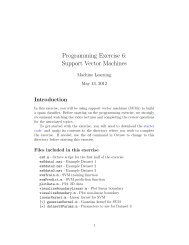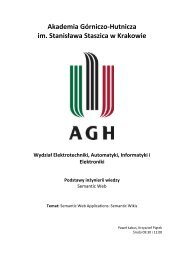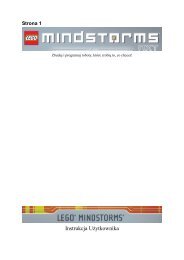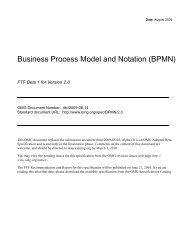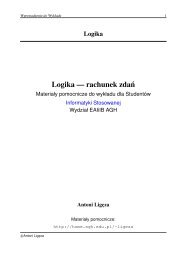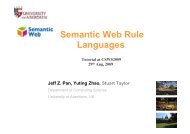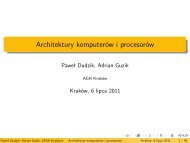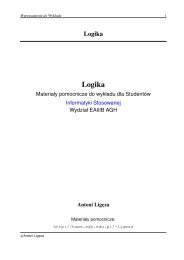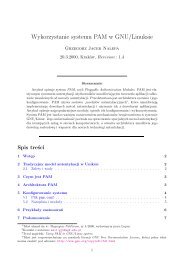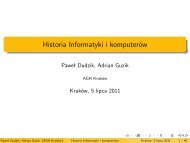An Evaluation of Knowledge Base Systems for Large OWL Datasets
An Evaluation of Knowledge Base Systems for Large OWL Datasets
An Evaluation of Knowledge Base Systems for Large OWL Datasets
You also want an ePaper? Increase the reach of your titles
YUMPU automatically turns print PDFs into web optimized ePapers that Google loves.
In terms <strong>of</strong> query, the results also lead to some scalability and efficiency concerns.<br />
Sesame-DB was very slow in answering some queries (even <strong>for</strong> one university), including<br />
Queries 2, 8, and 9. As <strong>for</strong> DLDB-<strong>OWL</strong>, it is the only system that has been<br />
tested with the largest dataset. One concern is that when it comes to the larger datasets<br />
especially the 50-university set, DLDB-<strong>OWL</strong>’ s query time no longer grows linearly<br />
<strong>for</strong> some queries, i.e., Queries 2, 5, 6, 7, 9, and 14. Moreover, it failed to answer<br />
Query 2 on the 50-univeristy dataset after MS Access ran out <strong>of</strong> temporary space. Regarding<br />
<strong>OWL</strong>JessKB, compared to the per<strong>for</strong>mance <strong>of</strong> its predecessor DAMLJessKB<br />
in [14], <strong>OWL</strong>JessKB improves its query time greatly at the sacrifice <strong>of</strong> much longer<br />
load time. Nonetheless, when <strong>OWL</strong>JessKB is queried with pre-defined patterns it is<br />
still the slowest in answering thirteen <strong>of</strong> the queries. However, it responds to the queries<br />
much faster when such patterns are not used and outper<strong>for</strong>ms the database-based<br />
systems <strong>for</strong> quite a few queries. Compared to other systems, Sesame-Memory is the<br />
fastest in answering almost all the queries. It is also the fastest in data loading. This<br />
suggests that it might be the best choice <strong>for</strong> data <strong>of</strong> small scale if persistent storage<br />
and <strong>OWL</strong> inference is not required.<br />
We have observed that those queries <strong>for</strong> which Sesame-DB’ s per<strong>for</strong>mance goes<br />
down dramatically are common in that they do not contain a specific URI as a subject<br />
or object in the statements. On the other hand, Sesame-DB shows a nice property in<br />
answering some other queries like Queries 3, 4, 5, 7, and 8: there was no proportional<br />
increase in the response time as the data size grows. We have also noticed a common<br />
feature <strong>of</strong> these queries, i.e., they have constant number <strong>of</strong> results over the test datasets.<br />
Whether these are the causes or coincidences is a subject <strong>for</strong> future work.<br />
It is beyond the scope <strong>of</strong> this paper to analyze in depth the query evaluation and optimization<br />
mechanism in each system. Instead, we propose some topics <strong>for</strong> future investigation.<br />
One is to explore the potential relationship between query types and the<br />
per<strong>for</strong>mance <strong>of</strong> a certain system and its characteristics. Of course how to categorize<br />
queries is yet another issue. As another, Sesame-DB implements the main bulk <strong>of</strong> the<br />
evaluation in its RQL query engine while its query engine <strong>for</strong> another query language<br />
SeRQL pushes a lot <strong>of</strong> the work down to the underlying DBMS. As <strong>for</strong> DLDB-<strong>OWL</strong>,<br />
it directly translates as much <strong>of</strong> the query <strong>for</strong> the database. Further work should be<br />
done to investigate how these design differences as well as the underlying DBMS used<br />
impact per<strong>for</strong>mance.<br />
3.3.3 Query Completeness and Soundness<br />
It was noted be<strong>for</strong>e that we have chosen the benchmark test queries according to several<br />
criteria. In addition, we have made ef<strong>for</strong>t to make those queries as realistic as<br />
possible. In other words, we want these queries to represent, to some extent, those in<br />
the real world. We are very interested in seeing what queries can be answered by each<br />
system.



